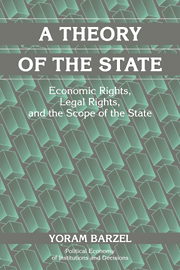Book contents
- Frontmatter
- Contents
- Preface
- 1 Introduction
- I The Emergence of Protection and Third-Party Enforcement
- 2 The State and the Enforcement of Agreements
- 3 Third-Party Enforcement and the State
- 4 The Choice among Enforcement Forms
- 5 Anonymous Exchange, Mixed Enforcement, and Vertical Integration
- 6 Jurisdictional Issues
- 7 Collective Action and Collective Decisions
- 8 Tying the Protector's Hands: The Agreement between Subjects and Protector
- II The Emergence of Legal Institutions
- III The Character of the State
- References
- Index
- Other Books in the Series
4 - The Choice among Enforcement Forms
Published online by Cambridge University Press: 04 December 2009
- Frontmatter
- Contents
- Preface
- 1 Introduction
- I The Emergence of Protection and Third-Party Enforcement
- 2 The State and the Enforcement of Agreements
- 3 Third-Party Enforcement and the State
- 4 The Choice among Enforcement Forms
- 5 Anonymous Exchange, Mixed Enforcement, and Vertical Integration
- 6 Jurisdictional Issues
- 7 Collective Action and Collective Decisions
- 8 Tying the Protector's Hands: The Agreement between Subjects and Protector
- II The Emergence of Legal Institutions
- III The Character of the State
- References
- Index
- Other Books in the Series
Summary
Agreements fall into two broad categories: (i) self-enforced and (2) thirdparty-enforced. As discussed in Chapter 3, the second category can be further broken down into two basic subcategories: (2a) those enforced by non-violent means and (2b) those enforced by violence. Individuals, of course, can also act in isolation (grow vegetables at home).
The definition of the state adopted here assigns to the state's enforcement only the agreements that fall into category (2b). Although the focus of this book is on the state, enforcement by the state shares many features with enforcement by non-violent third parties. The distinctions between self-enforced agreements and agreements enforced by any type of third party, then, may shed light on the nature of the state. In the first part of this chapter I discuss factors that affect individuals' choices between the two main categories; the rest of the chapter is devoted to the choice between the two modes of third-party enforcement.
Before commencing the main discussion, I make several points to enhance clarity. The first is that the agreement categories are not hierarchical. For example, owners of idiosyncratic commodities (authors' private diaries) are expected to protect them by themselves. As these become generic (published diaries), we expect that categories (1) and (2a) will be bypassed and that the state will undertake the protection. It is also important to recognize that agreements are routinely subject to multiple enforcement forms. For instance, parts of agreements may be enforced by violence, and other parts of the same agreements may be self-enforced. Still another point is that the existence of third-party enforcement, as argued in Chapter 2, is conditional on the presence of self-enforced relations.
- Type
- Chapter
- Information
- A Theory of the StateEconomic Rights, Legal Rights, and the Scope of the State, pp. 59 - 78Publisher: Cambridge University PressPrint publication year: 2001



